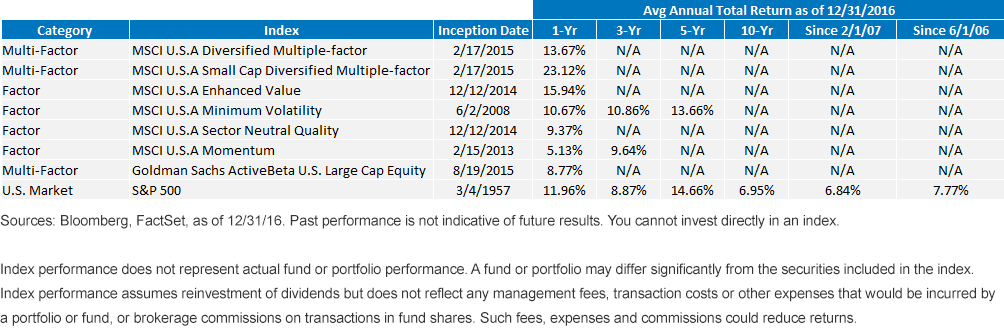Which Smart Beta Strategies Worked in 2016?


In 2016, billions of dollars flowed into so-called smart beta exchange-traded funds (ETFs)—funds that select stocks based on their exposure to individual factors such as low volatility, momentum or quality. Billions more flowed into funds tracking indexes incorporating several of these factors simultaneously—so-called multifactor funds.
So, how did these smart beta factors do relative to the S&P 500 Index? On balance, results were so-so: it was very much of a mixed year for many of the U.S. smart beta strategies.
If you use the MSCI single-factor indexes as your proxy, momentum, quality and minimum volatility all underperformed the S&P 500 Index. Of the major factors, only value and size outperformed. The MSCI USA Enhanced Value Index returned 15.9% and the Russell 2000 Index, a proxy for small-cap stocks, generated a 21.3% return, both handily beating the nearly 12% total return posted by the S&P 500, a proxy for the broad U.S. equity market.

For definitions of indexes in the chart, visit our glossary.
Success hinged on which smart beta factor one tilted toward, and in some cases, which smart beta index one used within a specific category. Although evaluating any smart beta strategy requires years of real-time performance, these 2016 results raise an interesting question: Is there an easier way to tap into the potential smart beta offers without taking on as much stock selection risk that typically accompanies these narrower smart beta strategies?
Based on a decade of real-time results, WisdomTree believes the answer is yes.
In 2016, for example, WisdomTree was eight for eight: each and every one of WisdomTree’s core U.S. equity indexes beat the S&P 500 Index. Put another way, if one had simply owned each of the major size segments of the U.S. equity market dividend-weighted or earnings-weighted, one would have generated excess returns relative to owning the entire U.S. market capitalization-weighted.

For definitions of indexes in the chart, visit our glossary.
- Large Cap: The WisdomTree Earnings 500 Index outperformed the S&P 500 by 223 bps, while the WisdomTree LargeCap Dividend Index beat the S&P 500 Index by 377 bps. Moreover, both WisdomTree Indexes beat the above-mentioned multifactor large-cap strategies offered from MSCI and Goldman Sachs.
- Mid-Cap: Both the WisdomTree MidCap Dividend Index and the WisdomTree MidCap Earnings Index generated returns in excess of 20%, outperforming the S&P 500 by more than 8 percentage points.
- Small Cap: And in the small-cap space, both the WisdomTree SmallCap Dividend Index and the WisdomTree SmallCap Earnings Index generated 2016 returns in excess of 30%, handily outpacing the 21% return posted by the Russell 2000, and the 23% return tallied by the MSCI multifactor small-cap strategy. Now, that’s smart beta!
Because the WisdomTree Indexes rebalance annually back to a measure of relative value, once a year they trade away from the price-driven, momentum-fueled movement of cap-weighted benchmarks. This gives WisdomTree a chance to tap into return premiums like value and quality, and in the case of our mid- and small-cap funds, size, in a disciplined, repeatable way, while providing broad exposures to traditional asset classes. Thus, WisdomTree provides the type of “multifactor” exposure investors are looking for. Because it’s never easy to predict which smart beta factor will outperform in a given year, it is probably best to get some exposure to most or all of them through a more diversified approach. Now, with real-time results coming in, it’s becoming easier to evaluate some of the newer strategies against those, like WisdomTree’s, that have been tested in real time over full market cycles.
Conclusion
All eight of WisdomTree’s core, size-segmented U.S. dividend-weighted and earnings-weighted equity Indexes beat the S&P 500 Index in 2016. In the process, they also beat many of the newer “factor-based” entrants into the smart beta indexing space. But 2016 is just part of a larger story. Since their respective real-time inceptions, spanning the last 10 years, seven of WisdomTree’s eight core U.S. Indexes have also outperformed their comparable capitalization-weighted peer. At a time when investors are attempting to complement beta exposures or replace active managers by combining single-factor strategies—or adopting multifactor strategies—WisdomTree is one of the few “smart beta” providers with a proven performance record.
Important Risks Related to this Article
Dividends are not guaranteed, and a company currently paying dividends may cease paying dividends at any time.

